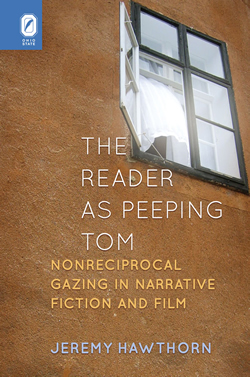The Reader as Peeping TomNonreciprocal Gazing in Narrative Fiction and FilmJeremy HawthornTheory and Interpretation of Narrative |
 6/10/2014 Literary criticism/ 246 pp. 6x9 
$97.95 cloth 978-0-8142-1257-8 Add cloth to shopping cart $33.95 paper 978-0-8142-5256-7 Add paper to shopping cart Shopping Cart Instructions Review/Change Shopping Cart & Check-out | |||
|
Explore More 1000 Frames of Rear Window (1954), The Alfred Hitchcock Wiki |
“Jeremy Hawthorn powerfully calls our attention to the consequential work—both epistemological and ethical—that is done by narrative and cinematic conventions we all but take for granted. By focusing on the ‘non-reciprocal relations’ that structure our experience of texts, Hawthorn not only discovers connections between works rarely and so provocatively paired, but also forwards a subtle and convincing argument about the relationship between the allure of voyeurism and the logic of imagination.” —Mark Goble, Department of English, University of California, Berkeley When we read a novel or watch a film, we become Peeping Toms. Spying on fictional characters, we can enjoy observing their private lives and most intimate secrets while safe in the knowledge that they are totally unaware of us. The Reader as Peeping Tom: Nonreciprocal Gazing in Narrative Fiction and Film, by Jeremy Hawthorn, examines the implications of this nonreciprocal relationship by focusing on works in which the relationships between characters are also nonreciprocal. Hawthorn focuses on four novelists and three filmmakers whose works are concerned with surveillance, spying, and voyeurism: Hawthorne, Dickens, Melville, Henry James, Hitchcock, Michael Powell, and Francis Ford Coppola. Hawthorn suggests that while some literary and film narratives use the reader’s or viewer’s sense of all-seeing invulnerability to underwrite the various systems of control and surveillance that are depicted in the work, others associate such forms of nonreciprocal observation with impotence and impoverishment and thus critique political systems that legitimize surveillance. Hawthorn concludes that critics have underestimated the extent to which reader’s or viewer’s sense of disempowerment adds meaning to the experience of fiction and film and may encourage acceptance or criticism of spying and surveillance in the real world. The book questions benign views of the reader’s or spectator’s role as passive observer, and offers original and exciting readings of some key narrative texts. Jeremy Hawthorn is emeritus professor in the department of language and literature at the
Norwegian University of Science and Technology, Trondheim, Norway. | |||

